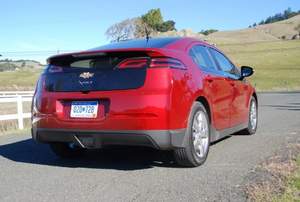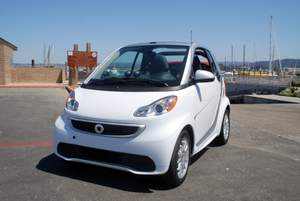Electric Car Price Wars — Part 2

Consumers interested in plug-in cars got more good news this month as the Mercedes-built Smart and Chevy Volt both joined the recent moves to drop prices on their models. The Smart dropped lease prices to $139/month, substantially below much of the competition. General Motors in turn announced the Volt’s price was being lowered by $5000. The actions follow similar moves by Nissan for the Leaf, Honda for its Fit EV and Fiat with the 500e, among others, and the announcement that the all-new BMW i3 electric car would start at $41,350 in the U.S.
That latter price was thought to be the catalyst for the Volt move, although it is very early in the electric car market to be attributing pricing countermoves to automakers. That said, the Smart price drop was clearly a reaction to the $199/month lease prices being promoted by Fiat (for the 500e), GM (for the Spark EV) and Nissan for the Leaf. In the same way the gasoline-powered two-passenger Smart is generally priced below the gasoline versions of those four-passenger competitors (or in the EV-only Leaf’s case, the Nissan Versa), it’s clear that Smart needed to drop its lease price to keep consideration of its Smart ED in the mix.

The Smart ED is the third generation electric car from the Mercedes-Benz sub-brand. It’s substantially improved from earlier versions with stronger performance, but is likely to struggle as its gasoline sibling does since the market for two-passenger cars is limited. Its appeal right now is as the lowest price electric car you can buy. Since most pure electrics are urban-oriented, limited use vehicles (with Tesla’s Model S the pricey exception), the diminutive Smart could yet find a niche. Dealers are reportedly getting additional marketing incentives that could lower prices even more.
Volt Price Drop
They Chevy Volt is in a different place. Since their almost simultaneous introductions, The Volt and Leaf have battled for sales leadership in the plug-in category, though this year the Tesla Model S has been challenging them. Nissan moved Leaf production from Japan to its Nashville, Tenn., plant this year and has started battery production there as well. The moves allowed Nissan to drop the Leaf price by $6,400 this year, which boosted sales by 2-3 times 2012’s level. Nissan also just announced that they have the capacity to increase Leaf production if sales remain strong or improve.
The Volt with its range-extending technology jumped out to an early lead over the pure-electric Leaf in sales last year, but the race has tightened this year with GM offering lease deals on the Volt to keep it competitive with the Leaf. GM claimed the price drop was possible because of manufacturing efficiencies, but it appears that market pressures may have been the prime motivator of the move. Along with the announcement of the $5,000 price drop for the 2014 model, GM also instituted a comparable $5,000 consumer rebate on 2012 and 2012 models that are still on dealer lots.
General Motors has consistently said it doesn’t expect to make any money on its first generation of the Volt, but hopes to change that with increased volumes and reduced costs with the next generation, due in 2015.
Getting the Same Treatment
As we noted in an earlier article, plug-in cars are starting to get the same treatment in the marketplace that conventional vehicles regularly do – garnering incentives and price adjustments based on consumer response to the vehicle. The additional pressure that electric cars face is that at present none of the models on the market are creating profits for the automakers, so incentive money or price drops add to an existing deficit. As is the case with any model, that strategy cannot play out long term.
In the interim consumers have a great opportunity with little risk (particularly in lease offers). Federal and state incentives added to lowered prices and special deals have brought electric cars into the same prices range as not only hybrids, but even regular gas models, particularly when operating costs are factored in. So the bargain choices are as follows (this is for pure electrics; of course, some of the models have limited availability at present) along with some of the variety now offered (most of the initial EVs on the market are subcompact or smaller cars):
Lowest Price: Smart ED, $139/month lease
Lowest Price 4-passenger: Chevy Spark EV, Fiat 500e, Ford Focus EV, Nissan Leaf – all at $199/month lease
Convertible Electric Car: Smart ED Cabriolet
Electric SUV: Toyota RAV4 EV
If you expand your search to include plug-in hybrids such as the Volt, your choices expand significantly with wagons such as the Ford C-Max Energi, midsize cars such as the Ford Fusion Energi or Honda Accord Plug-In or a plug-in version of the best-selling hybrid, the Toyota Prius Plug-In.
And next year the market will expand even more with new plug-in cars from Volkswagen, Mitsubishi, Cadillac, Porsche and Infiniti, among others.
Other similar articles you might find interesting:
The Top 10 Electric Cars You Can Buy
Top 10 Best-Selling High-MPG Cars
Electric Cars Are Cleaner Today & Will Only Get Cleaner

4 thoughts on “How to Find the Best Price for an Electric Car”